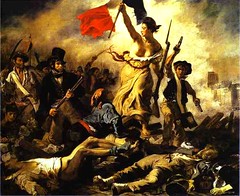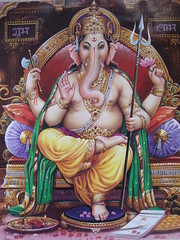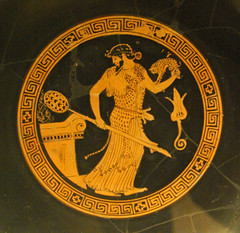Sunday, February 21, 2010
Why do we need God?
Setting aside the cosmological explanation, the concept of a personal God must answer some deep psychological need or needs that humans have, as it has been part of all cultures and societies throughout history. Neanderthals are not even the same species as us, yet flowers have been found in their graves suggesting some kind of ritual associated with death. Some people would say that this alone proves that a God of some kind exists but wide acceptance of an idea does not prove that it is true. What it says to me is that we humans have a longing for what we lack. As we know we are finite beings, we long for the infinite. As we know our lives are brief, we long for the eternal and as we know things only relatively, we long for the absolute. Infinite, eternal and absolute are words often used to define God across all religions.
But there can also be a longing for a more personal relationship. Andre Comte-Sponville says, “What do we wish for more than anything else? Leaving aside our base or vulgar desires, which have no need of God to be fulfilled, what we wish for most is: first, not to die, at least not completely, not irreversibly; second, to be reunited with the loved ones we have lost; third, for justice and peace to triumph; and finally and perhaps most importantly, to be loved.”
Freud of course went further and claimed that humans, when faced with the perils of life and frustrated by their helplessness, recalled memories of the protection afforded them by the father whom they both loved and feared in childhood and constructed a far mightier figure to protect them through the rest of their life and after death. While not totalling agreeing with Freud and what he called the universal neurosis, I do accept some of his arguments that humans made God to satisfy a range of unfulfilled needs and anxieties. My problem with Freud however, is that he is good at analysing the symptoms but not so helpful about offering a cure. He basically says we have to all grow up, stand on our own two feet and accept reality. Easier said than done!
I think we all have to find ways to cope with life and death – it is not necessarily a weakness or a neurosis, it is just human. We Atheists too no doubt have our own God substitutes and need to accept uncertainty. Much as I admire Richard Dawkins, like any fundamentalist he can be at times too certain of his beliefs. There is a freedom though, I think, in realising that we can depend only on ourselves and the people we love to help us through life. Maybe we would fight more to improve things in this life if we withdrew all expectations from the afterlife?
Even though their views on life after death and God are different to mine, I find that some religious figures are helpful as guides for this world. For instance, I respect Jesus for his teachings about humanity and for his emphasis on love, compassion and tolerance. It is not always easy to live in accordance with those values (tolerance is particularly difficult I find) but at least we can try. At its best, belief in God can promote the elevation of those values over things such as power, wealth and bodily pleasure. This is obviously not a bad thing but in my opinion it is not exclusive to a belief in God and can also be achieved with the use of reason and an understanding of human nature.
[The future of an Illusion by Sigmund Freud (Penguin books Great Ideas, London 2004) and again the Book of Atheist Spirituality by Andre Comte-Sponville were used in this post]
Tuesday, February 16, 2010
Spirituality
Just because I don’t believe in an immortal soul does not mean I am without a desire for a meaningful or spiritual existence. Many people think that spirituality is confined to religion but I think they are not synonymous. I define spirituality as a longing to look beyond the self and feel at one with the universe. I suppose it is all in the mind and no doubt there is a perfectly good evolutionary reason for why we feel this way. Whatever the reason, I think there are many ways to be spiritual. I think you can achieve it through any activity that absorbs you completely. Some people find it through observation of nature, through meditation, through music or through art.
I most often achieve this by looking at the stars. I find the infinite and eternal nature of the night sky incredibly soothing. All my worries, anxieties and irritations fall away into insignificance and I realize that nothing really matters as I am a tiny finite speck in the universe, yet nevertheless I still am a part of it. It contains me yet it is indifferent to me and for some inexplicable reason that makes me feel peaceful and happy rather than scared or alone.
I have also found meditation very beneficial and sometimes I can achieve a similar feeling to star-gazing through just clearing my mind and listening to the silence. It kind of feels like the barrier between the body and the world has disappeared and you are just floating openness. Apparently it is called the oceanic feeling. It is very strange but not unpleasant and on one or two occasions I swear I have felt bliss. I know it must just be some chemical reaction but whatever causes it, it is good! I think that is why Eastern religions or philosophies can be appealing as you learn to look inward for your own salvation or enlightenment.
But at other times I think spirituality is whatever makes you feel really alive. It is when time appears to stand still or no longer matters. You can feel it sometimes when transfixed by a painting from another place and time or when reading books written long ago that resonate with you and you realize that despite everything it is good to belong to the human race. I know there is much we can change or improve about our world but I feel gratitude for life rather than despair. I agree with Andre Comte-Sponville when he says “Why dream about Paradise? The Kingdom is here and now.”
[The Book of Atheist Spirituality, Bantam Press, Great Britain 2008]
Sunday, February 7, 2010
What is the point of Life?

NASA's Great Observatories Celebrate the International Year of Astronomy
Originally uploaded by NASAJPL
How did everything begin?
What am I here for?
What happens when I die?
These are the ultimate existential questions that confront us when discussing life, religion, philosophy and the universe. For me, the Big Bang theory seems the best answer so far to the first question. The conditions that gave rise to life on earth seem very precise and rather improbable yet along with evolution seem to me to be the most likely explanation of the fact that we are here. What was there before the Big Bang and why it happened at all still seem unanswered but maybe that is due more to the limitations of my understanding rather than to gaps in scientific knowledge.
However, the purpose of the universe and of life on earth has not to my knowledge been answered yet by science. I know physicists are searching for the unifying theory but maybe it will still turn out to be just another mechanistic explanation rather than the reason or purpose for the universe. Personally I am happy to make my own purpose and just accept not knowing or being uncertain of any other, but I do rather like the idea of the giant experiment run by mice as described in the Hitchhiker’s guide to the Galaxy. It is certainly more appealing to me than the idea of God as described in the Bible.
I suppose there is a chance that some creative force was responsible for the Big Bang and everything that has happened since including evolution. Where the force came from is still a mystery, as is its purpose. We can speculate that maybe the purpose was because it could, or because it wanted to see what would happen. Or maybe there was some other purpose that we do not know of yet, or will ever know given our relative unimportance in the scheme of things. You could call this force God if you like but I think it would have to be a different God to the one described in Bible for a number of reasons.
Firstly, it says in the Bible that God created man in his own image and I have a real problem seeing some sort of supernatural human being physically able to create the universe. The force that created the universe by definition must be something quite different to us and we can probably not imagine what it might look like or how it might think. Secondly it does not seem to me that the universe was created for us or that we are at the centre of it as the bible suggests. We are just one species among many on a small planet on the edge of one galaxy among many in the universe. Therefore it is rather arrogant to think that we are the end product of evolution and the reason for it, let alone that this force would have some special attachment to one tribe of our species in a small part of this planet or that it would necessarily want to intervene in any way.
I think that in fact we have created God in our own image for a variety of reasons including the natural human desire to find patterns and the desire for order and certainty in a chaotic world. Perhaps though it is mostly to do with the last question: what happens when we die? That is our greatest fear and maybe the hardest to deal with. I believe that we have to accept death as the end of our life and that there is nothing after death. Many people believe in an after-life where there may be personal consciousness of some kind or even reincarnation. That doesn’t appeal to me particularly but when dealing with the death of people I love, I try to find consolation in philosophy, mythology and spirituality. Spirituality like morality does not have to be confined to religion or a belief in a God as I hope my next post will show!
Saturday, January 30, 2010
Book Review 2 – The Pagan Christ by Tom Harpur
I read this book a few years ago and was very surprised that a former Professor and Anglican priest would argue that Christianity is a synthesis of Ancient Egyptian and pagan mystery religions with a Jewish twist. It even reconciled me to Christianity a little, because I discovered that despite the overt suppression of Greek and Roman philosophy and the burning of pagan libraries by Christians, many of the ideas and myths of the ancient world in fact survived by being integrated into Christianity. It is a well researched book with good footnotes and an extensive bibliography that has provided me with lots of further reading by authors such as Bishop Spong, Robert Funk and the Jesus Seminar and Sir James Frazer (author of the seminal Golden Bough).
The theme of the book is complex but the main thrust is the incredible similarity that exists between Jesus and the many saviour gods that existed in the ancient world particularly the Egyptian God Horus, whom Harpur claims is the original archetypal Christos. The idea that a man-god who could be born of a virgin, perform miracles, suffer and die yet be resurrected to eternal life it seems did not originate with Jesus. Harpur believes that the truth and relevance of these tales have nothing whatever to do with actual happenings in history but everything to do with changing consciousness to “receive sublime truths accessible in no other way”. He means by way of symbols, allegories and myths.
Harpur believes Plato’s idea that we are all “sparks of divine fire struck off from the flint of the Eternal”, immortal souls clad in mortal bodies and that the divine is within all of us. He says that the ancient messiahs were symbolic sun figures who came not only each day with the sunrise and sunset, but were renewed through the seasons, the solstices and the equinoxes. Worshippers could take part in this renewal through mystery dramas and rituals and thereby awaken their own divinity. He believes that the sole and crucial difference between the ancient myths and Christianity is that Christianity eventually concentrated this endless universal concept into a single historical person, Jesus, and the unrepeatable events of his life.
In Harpur’s opinion, timeless myth had been misread as biography. Christianity took a tragically wrong turn at the end of the third century by denying and trying to destroy its pagan roots. People were then forced to look externally to a morally perfect and unreachable Saviour instead of looking within for the divine and understanding the true meaning of the cross as the symbol of spirit entering matter. Oddly enough, Jesus appears to says this in Luke 17:21 “for in fact the kingdom of God is within you.” It is fascinating stuff and I realised that in the end, perhaps it is just a matter of terminology that separates me from religion as I prefer to use the words nature, the universe and life-energy instead of the words god, divinity, and immortal soul.
Monday, January 25, 2010
Balancing reason with mythology
It occurs to me that I may have unintentionally given the impression that I am some kind of modern day Aristotle wrestling with deep metaphysical concepts such as Truth, Justice and the meaning of life while leading a life of impeccable virtue and moderation under the grapevines. This is not exactly the case. I don’t think I practice what I preach any more than your average philosopher. I have to confess that the only thing that stops me giving in totally to the sins of the flesh is concern for my health, not classical ideals of self-control and restraint. My virtues only really consist of being kind to animals and small children. I thought it best to be up front on that point before continuing my exploration of the philosophy and religion of the classical world.
Greek and Roman philosophers discussed morality, ethics and how to lead the Good Life from an entirely human perspective because their Gods were by and large uninterested in questions of morality. The Gods were larger than life humans who happened to be immortal and seemed to spend most of their time quarrelling, chasing lovers and sulking. The concept of life after death was mostly confined to a ghostly existence in the gloomy Hades along with everyone else. Only special heroic individuals like Heracles could look forward to the blessed fields of Elysium wherever they were!
The Gods obviously began as nature gods who developed special attachments to places or to cities. Temples were the houses of the Gods not where a congregation met for worship. You could pray to a particular God for protection when travelling for instance but all Gods and humans were at the mercy of the blind, indifferent Fortuna or chance. Religion was part of the civic duty toward your country and honoring the Gods meant honoring the State and its institutions. (This is why the Christians were seen as a treasonous cult and got into trouble later)
There was no revealed scripture but stories of the gods and their all too human antics abounded. Greek dramatists used the myths about the Gods to reveal profound truths about what it is to be human. The Oedipus complex described by Freud took its insights from the ancient myth. Plays like the Bacchae by Euripides pointed out the danger of trying to suppress the irrational in humans, a tendency that the Greeks and some would say our own culture, had. As the play shows, the desire to forget moderation and reason and find transcendence in a frenzy of ecstatic worship of Dionysus, the God of the Vine, had become increasingly popular.
Logos or rationality led to some of the great developments in mathematics, science and philosophy yet the role of mythos or the irrational perhaps equally contributed to classical culture. Maybe it is too easy in a rational world to underestimate the importance of the imagination and the outlet or catharsis that stories, music, dance and art provide in expressing human emotions and anxieties.
Greek and Roman philosophers discussed morality, ethics and how to lead the Good Life from an entirely human perspective because their Gods were by and large uninterested in questions of morality. The Gods were larger than life humans who happened to be immortal and seemed to spend most of their time quarrelling, chasing lovers and sulking. The concept of life after death was mostly confined to a ghostly existence in the gloomy Hades along with everyone else. Only special heroic individuals like Heracles could look forward to the blessed fields of Elysium wherever they were!
The Gods obviously began as nature gods who developed special attachments to places or to cities. Temples were the houses of the Gods not where a congregation met for worship. You could pray to a particular God for protection when travelling for instance but all Gods and humans were at the mercy of the blind, indifferent Fortuna or chance. Religion was part of the civic duty toward your country and honoring the Gods meant honoring the State and its institutions. (This is why the Christians were seen as a treasonous cult and got into trouble later)
There was no revealed scripture but stories of the gods and their all too human antics abounded. Greek dramatists used the myths about the Gods to reveal profound truths about what it is to be human. The Oedipus complex described by Freud took its insights from the ancient myth. Plays like the Bacchae by Euripides pointed out the danger of trying to suppress the irrational in humans, a tendency that the Greeks and some would say our own culture, had. As the play shows, the desire to forget moderation and reason and find transcendence in a frenzy of ecstatic worship of Dionysus, the God of the Vine, had become increasingly popular.
Logos or rationality led to some of the great developments in mathematics, science and philosophy yet the role of mythos or the irrational perhaps equally contributed to classical culture. Maybe it is too easy in a rational world to underestimate the importance of the imagination and the outlet or catharsis that stories, music, dance and art provide in expressing human emotions and anxieties.
Tuesday, January 19, 2010
Humanism and the Enlightenment

Delacroix, Eugene (1798-1863) - 1830 Liberty Leading the People (Louvre)
Originally uploaded by RasMarley
Humanism embraces modern science, democratic principles, human rights, free inquiry and the separation of Church and State. It rejects the notions of sin and guilt particularly in the area of sexual choice. I think it is a very liberating and joyful philosophy of life. It means taking control of one’s own life and finding your own answers to the great questions of life. It does not mean that anything goes or that all worldviews are equal, rather that there are objective criteria against which we should evaluate these views. Respect for the law and for human rights being amongst the most important.
The Enlightenment (1700-1800) had a profound effect not only on Humanism but also on law in the Western world with the idea expressed in the American Declaration of Independence “that all men are created equal” and deserve equality under the law.(It would take another century before these concepts would be applied to women, children and non-white people as well!) The Enlightenment was opposed to the arbitrary use of power by Monarchies and the Clergy and further influenced the American Declaration of Independence with the revolutionary idea that we all have a “right to life, liberty and the pursuit of happiness” regardless of social status.
At the same time, advances in science encouraged the idea that direct observation of nature rather than reliance on sacred texts could be the answer to some of the most important questions that confront humans. Ethics and values began to be discussed for the first time since antiquity in terms of a humanist world rather than one lived in obedience to God-given rules.
John Locke and Jean-Jacques Rousseau, famous philosophers of the Enlightenment, believed that humanity, in a pursuit of a better and more civilized way of life, has agreed to an implicit ‘social contract’ through which people grant certain rights to their neighbors in order to get the same rights for themselves. However with these rights come civic responsibilities. I think most people now accept that the rights of the individual sometimes need to be balanced by the greater good of society as a whole. But I will discuss the Utilitarianism philosophers John Stuart Mill and Jeremy Bentham and their contribution to my Atheist view of the Good Life another time!
Wednesday, January 13, 2010
How to Live the Good Life
Ancient Greek philosophy is appealing to me as it is very much concerned with how to live the Good Life or how to achieve eudaimonia. This word is often translated as happiness but should be viewed as a state of mind rather than as a result of a particular pleasure. It is often described as ‘flourishing’ or the realization of human potential.
Greek philosophers also believed that virtue or arête was essential to happiness. Arête is not just about moral virtues such as justice, moderation, courage and wisdom, it also includes attributes such as beauty, good health and doing something well. Socrates claimed that a person who is not virtuous cannot be happy and that a person who is virtuous cannot fail to be happy. Different schools of thought grew up around the exact balance needed between virtue and happiness in order to lead a good life. Discussion on these issues was human-centred, often heated and independent of any super-natural law giver or deity which, in my opinion, makes it still relevant today.
Despite this, Socrates, Plato and Aristotle are not my favourite philosophers probably because I find them so hard to understand. I prefer my philosophy or guide to life a little simpler which is why I prefer Epicurus (although Socrates was good in encouraging people to think for themselves and be sceptical). However, a study of Aristotle’s book Ethics is useful, as he claimed that the natural function of humans was to reason and that to reason well is to reason in accordance with virtue. Epicurus agreed with him saying that of all the virtues, wisdom is the greatest, for through it we can learn which pleasures to seek and which to avoid.
Aristotle believed that we are driven by our natural instincts or passions and that we can achieve virtue if we seek the mean in the expression of these feelings. For example, for the feeling of fear, courage is the mean, rashness is the excessive expression and cowardice is the deficient expression. Virtues include generosity, prudence, patience and modesty. All the old biblical vices or sins such as envy, licentiousness, vanity and shamelessness are mentioned as either the deficient or excessive expression of human feelings or actions. Aristotle believed that virtue is not necessarily a capacity we are born with, we must develop it through practice and reason.
Unlike the Stoics who believed we should be indifferent to power, wealth and bodily pleasures and be happy with virtue alone, Aristotle was not so extreme and believed that friendship and good fortune in life and body were as important as reason and virtue in living the good life.
[I have found Philosophy: 100 Essential Thinkers by Philip Stokes (Arcturus Publishing, London 2008) and This is not a book: Adventures in Popular Philosophy by Michael Picard (Allen & Unwin, Crows Nest NSW 2007) and of course Wikipedia helpful for this post and for the post on Epicurus.]
Subscribe to:
Posts (Atom)






